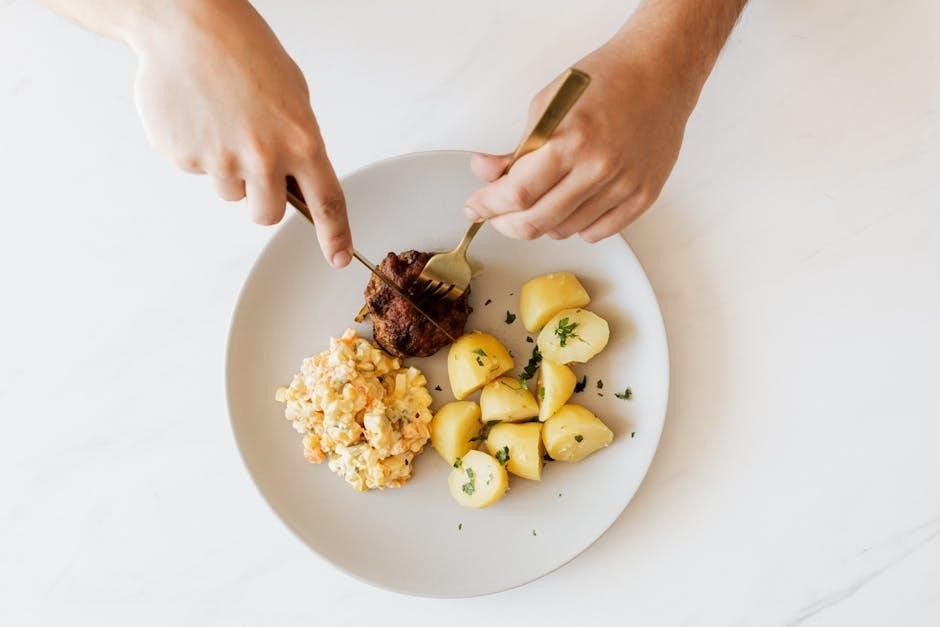A 3000-calorie meal plan is designed to meet high energy needs, suitable for athletes, active individuals, or those aiming to gain weight healthily․ It emphasizes balanced nutrition, portion control, and nutrient-dense foods to support muscle growth, energy, and overall health while maintaining dietary variety and sustainability․
Understanding the Need for a High-Calorie Diet
A high-calorie diet is essential for individuals requiring significant energy intake, such as athletes or those aiming to gain weight․ It supports muscle growth, recovery, and sustains high activity levels․ Balancing macronutrients ensures proper nutrition without sacrificing variety, promoting overall health and energy․ This approach helps meet dietary needs effectively while maintaining long-term sustainability․
Key Components of a Balanced 3000 Calorie Meal Plan
A balanced 3000-calorie meal plan focuses on macronutrient balance, with carbohydrates, proteins, and fats distributed to optimize energy and health․ Emphasizing whole, nutrient-dense foods like lean meats, whole grains, fruits, and vegetables ensures adequate vitamins and minerals․ Incorporating healthy fats and hydration is crucial․ Meal frequency and portion sizes are tailored to individual needs, promoting sustained energy and satisfaction․ Diversity in food choices helps maintain interest and ensures all nutritional requirements are met, supporting overall well-being and dietary goals effectively․

Importance of Macronutrient Balance
Balancing carbohydrates, proteins, and fats is crucial for optimal energy, muscle repair, and hormone production․ A 40-30-30 distribution supports performance and overall health effectively․
Carbohydrates: The Primary Energy Source
Carbohydrates are the body’s main energy source, fueling workouts and daily activities․ Aim for 40% of calories from carbs, focusing on complex sources like whole grains, fruits, and vegetables․ These provide sustained energy and essential nutrients․ Incorporating a variety ensures steady glucose levels, supporting muscle function and recovery․ Pairing carbs with protein and fats enhances balanced nutrition, aligning with dietary guidelines for optimal health and performance․
Protein: Building and Repairing Tissues
Protein is essential for tissue repair, muscle growth, and overall health․ Aim for 30% of daily calories from protein sources like lean meats, fish, eggs, dairy, and plant-based options․ This supports muscle recovery, especially for active individuals, and contributes to a balanced diet․ Incorporating varied protein-rich foods ensures adequate amino acids for optimal bodily functions, aligning with dietary guidelines for sustainability and health․
Fats: Essential for Hormone Production and Energy
Fats are vital for hormone production, brain function, and energy storage․ They aid in absorbing fat-soluble vitamins like A, D, E, and K․ Healthy fats, such as avocados, nuts, and olive oil, are rich in calories, making them ideal for a high-energy diet․ Balancing saturated and unsaturated fats ensures optimal health․ Incorporating fats into meals boosts calorie intake and supports bodily functions, making them a cornerstone of a 3000-calorie meal plan for active individuals or those needing weight gain․
Structuring the 3000 Calorie Diet
A balanced 3000-calorie diet involves distributing calories evenly across meals and snacks, ensuring adequate macronutrient intake while maintaining variety and nutritional density for sustained energy and muscle growth․
Breakfast: Starting the Day with a Nutrient-Dense Meal
Breakfast is crucial for kickstarting metabolism and energy levels․ A 3000-calorie meal plan typically includes hearty, nutrient-rich options like whole-grain pancakes, scrambled eggs, Greek yogurt, or smoothies․ Incorporating protein, complex carbs, and healthy fats ensures sustained energy․ Portion sizes are key, with calorie-dense foods like avocado or nuts adding extra calories․ Variety keeps meals engaging, ensuring a broad spectrum of vitamins and minerals to support overall health and performance throughout the day․
Lunch: Maintaining Energy Levels Throughout the Day
A balanced lunch is crucial for sustaining energy and focus․ Incorporate lean proteins like grilled chicken or fish, complex carbs such as whole grains or quinoa, and healthy fats from avocado or nuts․ Pair with colorful vegetables to ensure vitamins and minerals․ Portion sizes should be generous to meet calorie goals without compromising nutrition․ Avoid heavy, greasy foods that may cause energy dips․ Opt for meals that are both satisfying and nutrient-dense, supporting overall health and performance throughout the day․
Dinner: Ending the Day with a Satisfying Meal
Dinner should be a nutrient-rich, satisfying meal to replenish energy stores after a day of activity․ Aim for a balanced mix of proteins, carbohydrates, and fats․ Include lean proteins like grilled meats or fish, paired with complex carbs such as whole grains or vegetables․ Healthy fats like avocados or nuts add flavor and satiety․ A well-rounded dinner supports recovery, aids in muscle repair, and prepares the body for the next day․ Portion sizes should align with your calorie goals, ensuring a fulfilling yet balanced conclusion to the day․
Snacks: Bridging the Gap Between Meals
Snacks play a vital role in maintaining energy levels and supporting muscle recovery․ Opt for nutrient-dense options like nuts, seeds, or protein bars, which provide a balanced mix of carbs, protein, and fats․ Fresh fruits, yogurt, or hard-boiled eggs are also excellent choices․ Aim for snacks rich in fiber and protein to keep you full and energized․ Staying hydrated with water or electrolyte-rich beverages is equally important․ Plan snacks wisely to ensure they contribute to your daily calorie goals without compromising meal quality or variety․

Benefits of a 3000 Calorie Meal Plan
A 3000-calorie meal plan supports muscle growth, enhances energy levels, and improves overall health by providing adequate nutrients for active individuals or those seeking weight gain․
- Supports muscle growth and recovery․
- Boosts energy levels for daily activities․
- Improves overall nutritional health and well-being․
Supporting Muscle Growth and Recovery
A 3000-calorie meal plan is ideal for individuals seeking to build or repair muscle tissue․ With adequate protein intake, it supports muscle synthesis and recovery post-workout․ Carbohydrates provide sustained energy for intense training, while healthy fats aid in hormone production, which is crucial for muscle growth․ Balancing these macronutrients ensures optimal muscle function and recovery, making it a popular choice among athletes and bodybuilders aiming to enhance physical performance and strength․
Increasing Energy Levels
A 3000-calorie meal plan is tailored to boost energy levels by providing sufficient fuel for the body․ Balanced macronutrients ensure sustained energy, with carbohydrates as the primary source, proteins for muscle repair, and fats for metabolic functions․ Regular, nutrient-dense meals help maintain energy levels throughout the day, reducing fatigue and enhancing physical performance․ This approach supports active lifestyles and high-energy demands, ensuring the body operates at its best․
Improving Overall Nutritional Health
A 3000-calorie meal plan promotes overall nutritional health by ensuring adequate intake of essential vitamins, minerals, and fiber․ It supports immune function, reduces chronic disease risks, and enhances mental clarity․ Balanced macronutrient ratios and varied food choices help maintain optimal bodily functions, making it a sustainable approach for long-term health and wellness․

Common Challenges and Solutions
Challenges: Managing large portion sizes, ensuring meal variety, and maintaining hydration․ Solutions: Plan meals, use calorie-dense foods, and drink fluids between meals to avoid overeating․
Managing Portion Sizes
Portion control is crucial for maintaining a balanced 3000-calorie diet․ Use a food scale or measuring cups to accurately gauge serving sizes․ Focus on whole, nutrient-dense foods like lean proteins, whole grains, and vegetables․ Adjust portions based on activity levels and goals․ For example, active individuals may require larger servings of carbohydrates and proteins․ Avoid overeating by eating mindfully and stopping when satisfied․ Tracking intake with a food diary can also help maintain consistency and ensure nutritional needs are met without overconsumption․
Ensuring Variety in Meals
Ensuring variety in a 3000-calorie meal plan is crucial for both satisfaction and nutritional completeness․ Rotate protein sources like lean meats, fish, and legumes, and incorporate diverse whole grains, fruits, and vegetables․ Healthy fats, such as nuts and avocados, add flavor and essential nutrients․ Experiment with herbs and spices to enhance meals without adding calories․ Meal planning can help maintain variety, ensuring no food group is overlooked․ This approach supports long-term sustainability and keeps the diet enjoyable and balanced․

Sample 3000 Calorie Meal Plan
A sample plan includes oatmeal with fruits for breakfast, grilled chicken with quinoa and vegetables for lunch, salmon with sweet potatoes for dinner, and nuts as snacks․
Breakfast Options
Breakfast is a crucial meal to kickstart your day․ For a 3000-calorie meal plan, opt for nutrient-dense options like oatmeal with nuts and dried fruits, scrambled eggs with whole-grain toast, or Greek yogurt with granola and berries․ Smoothies with protein powder, milk, and fruits are also excellent․ Consider avocado toast on whole-grain bread or a breakfast burrito with eggs, cheese, and salsa․ These options provide a balanced mix of carbohydrates, proteins, and fats to fuel your morning and support your dietary goals․
Lunch Ideas
A satisfying lunch for a 3000-calorie meal plan should include protein, complex carbs, and healthy fats․ Grilled chicken breast with quinoa, roasted vegetables, and a side of avocado provides balanced nutrition․ A hearty turkey and cheese wrap with whole-grain tortilla, paired with a mixed green salad, ensures sustained energy․ Adding a small bowl of nuts or seeds boosts calorie intake while maintaining nutritional value․ These options promote muscle recovery and energy levels throughout the day․
Dinner Recipes
Dinner recipes in a 3000-calorie meal plan should be hearty, nutrient-dense, and calorie-rich․ Grilled chicken with roasted vegetables, salmon with quinoa, or beef stir-fries are excellent options․ Incorporate complex carbs like brown rice or sweet potatoes, paired with lean proteins and healthy fats․ Portion sizes should be generous to meet calorie goals․ Adding calorie-dense sides like avocado or olive oil can enhance meals․ These recipes support muscle recovery and provide sustained energy, ensuring a balanced and satisfying end to the day․
Snack Suggestions
Incorporate nutrient-dense snacks to maintain energy levels between meals․ Opt for high-calorie options like mixed nuts, dried fruits, or energy bars․ Fresh fruit paired with nut butter or hummus provides a healthy, satisfying choice․ Greek yogurt with honey and seeds is another excellent option․ Consider hard-boiled eggs, jerky, or avocado for quick, protein-rich snacks․ These options help meet daily calorie goals while ensuring a balanced intake of macronutrients․

Final Thoughts on Implementing the Plan
Consistency and patience are key when following a 3000-calorie meal plan․ Stick to balanced, nutrient-dense meals and monitor progress regularly․ Adjust portions or food choices as needed to meet energy and nutritional goals․ A well-planned diet not only supports muscle growth and recovery but also enhances overall health․ Stay committed, and with time, the results will reflect your dedication․ Remember to consult a healthcare professional for personalized advice to ensure the plan aligns with your specific needs and lifestyle․
